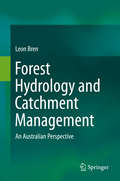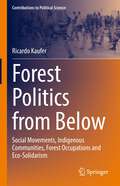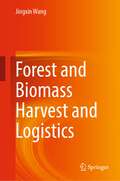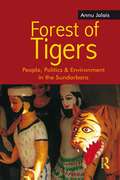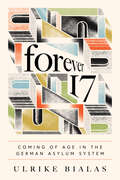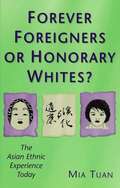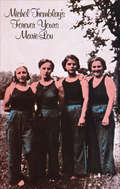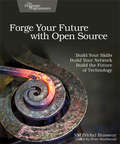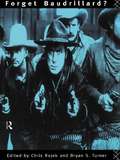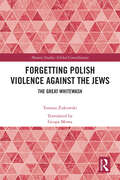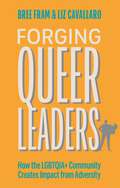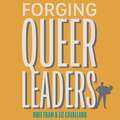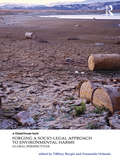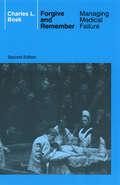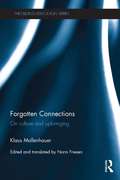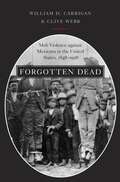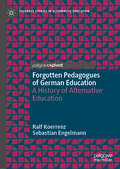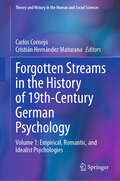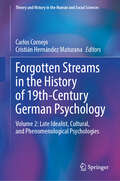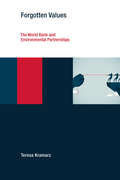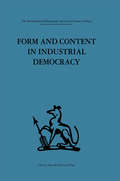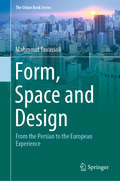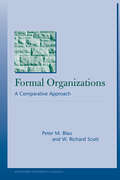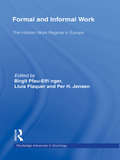- Table View
- List View
Forest Hydrology and Catchment Management
by Leon BrenFor the last three centuries forests have been recognised as providing the best water catchments and valued for their sustained output of high quality water. In Australia, work which was commenced fifty years ago has come to fruition and is providing new information on forest hydrology issues. The book focusses on the issues of small streams, including catchment definition, slope, hydrograph formation, water quality measurement, and annual water yield. The world-wide management issues of sustaining riparian forests are examined, using the River Murray forests as an example. Finally a large amount of information is drawn together to examine the management of forested catchments for water supplies. This book presents an incisive, disciplined, quantitative approach to dealing with forest hydrology matters. Although world-wide in application, the book particularly draws on Australian studies. It is written with the needs of students and forest practitioners in mind.
Forest Politics from Below: Social Movements, Indigenous Communities, Forest Occupations and Eco-Solidarism (Contributions to Political Science)
by Ricardo KauferThis book presents an analysis of forest politics that employs a broader scope to include non-institutionalized actors. It offers a comparative perspective on various environmental social movements fighting to protect forests around the globe, including indigenous communities in the Amazon and eco-anarchists in Europe. By examining the political goals, motives, and tactics of these sometimes-radical environmentalists, it helps readers understand the commonalities and differences among these “grass-roots forest politicians.” In addition, the book highlights the importance of forest-related struggles for a just transition to a carbon-neutral future. Accordingly, it will appeal to scholars of political science, public policy, and political sociology, as well as anyone interested in social movements and forest conservation.
Forest and Biomass Harvest and Logistics
by Jingxin WangThis book explains forest and woody biomass harvest, harvesting machines, systems, logistics, supply chain management, best management practices, harvest scheduling and carbon sequestration. It also covers applications of harvesting principles in forest and biomass management practices. The book provides an in-depth understanding of functions and applications of current and future harvesting technologies, the unique characteristics of harvesting machine with respect to cost, productivity, and environmental impacts. Special features include harvest machine illustrations and images of field operations, tabular presentations of filed studies of forest operations and detailed modelling processes for forest and biomass harvest logistics and supply chain management. Specifically, the book is designed for students, researchers, educators, and practitioners in the field of forest and biomass harvest and logistics. The book’s contents have been tested in teaching as the Harvesting Forest Product class for undergraduates and graduates in the Division of Forestry and Natural Resources at West Virginia University since 2000. The information contained in this book is a robust reference resource for students who would be future forest and biomass managers, timber contractors, entrepreneurs, researchers, and educators in the fields of forest and biomass operations, engineering, and resource management.
Forest of Tigers: People, Politics and Environment in the Sundarbans
by Annu JalaisAcclaimed for its unique ecosystem and Royal Bengal tigers, the mangrove islands that comprise the Sundarbans area of the Bengal delta are the setting for this pioneering anthropological work. The key question that the author explores is: what do tigers mean for the islanders of the Sundarbans? The diverse origins and current occupations of the local population produce different answers to this question – but for all, ‘the tiger question’ is a significant social marker. Far more than through caste, tribe or religion, the Sundarbans islanders articulate their social locations and interactions by reference to the non-human world – the forest and its terrifying protagonist, the man-eating tiger. The book combines rich ethnography on a little-known region with contemporary theoretical insights to provide a new frame of reference to understand social relations in the Indian subcontinent. It will be of interest to scholars and students of anthropology, sociology, development studies, religion and cultural studies, as well as those working on environment, conservation, the state and issues relating to discrimination and marginality.
Forever 17: Coming of Age in the German Asylum System (Ethnographic Encounters and Discoveries)
by Ulrike BialasAn exploration of how age affects the experience and life prospects of asylum-seekers in Germany. Heartbreaking images of children in distress have propelled some of the most urgent calls for action on immigration crises, and that compassion often affects how state asylum policies are structured. In Germany, for example, the immigration system is engineered to protect minors, which leads to unintended consequences for migrants. In Forever 17, Ulrike Bialas follows young African and Central Asian migrants in Germany as they navigate that system. Without official paperwork or even, in many cases, knowledge of their exact age, migrants must decide how to present their complicated life stories to government officials. They quickly realize that their age can have an outsized effect on the outcome of their cases. A migrant under 18, for example, can’t be deported, but might instead be placed in a youth home, where they will be subject to strict curfew laws. An 18-year-old adult, on the other hand, can get permission to work, but not opportunities to go to school. Regardless of their age—actual or assumed—migrants face great difficulties. Those classified as minors must live with the psychological burden of being treated like children, while those classified as adults must live without the practical support and legal protections reserved for minors. The significance of age stands in stark contrast to the ambiguities inherent in its determination. Though Germany’s infamous bureaucracy is designed to issue clear statements about refugees and migrants, the truth is often more complicated, and officials are forced to grapple with the difficult implications of their decisions. Ultimately, Bialas shows, policies surrounding asylum seekers fall dramatically short of their humanitarian ideals. Even those policies designed to help the most vulnerable can lead to outcomes that drastically limit the possibilities for migrants in real need of protection and keep them from leading fulfilling lives.
Forever Foreigners or Honorary Whites? The Asian Ethnic Experience Today
by Mia TuanTuan examines the salience and meaning of ethnicity for later generation Chinese and Japanese Americans, and asks how the racialized ethnic experience differs from the white ethnic experience. She interviewed 95 middle-class Chinese and Japanese Californians and analyzed the importance of ethnic and racial identities, and the concept of becoming a "real" American for both Asian and white ethnics. She asked her subjects about their early memories and experiences with Chinese/Japanese culture, their current lifestyles and emerging cultural practices, their experiences with racism and discrimination, and their attitudes toward current Asian immigration.
Forever Yours, Marie-Lou
by Michel Tremblay Bill Glassco John Van BurekTwo grown sisters confront the memory of their parents' tragic death.This revised edition of Forever Yours, Marie-Lou, which played at the 1990 Stratford Festival, is John Van Burek and Bill Glassco's translation of Michel Tremblay's original French text.Cast of 3 women and 1 man.
Forge Your Future with Open Source: Build Your Skills. Build Your Network. Build the Future of Technology.
by Vm Vicky BrasseurFree and open source is the foundation of software development, and it's built by people just like you. Discover the fundamental tenets that drive the movement. Take control of your career by selecting the right project to meet your professional goals. Master the language and avoid the pitfalls that typically ensnare new contributors. Join a community of like-minded people and change the world. Programmers, writers, designers, and everyone interested in software will make their mark through free and open source software contributions. Free and open source software is the default choice for the programming languages and technologies which run our world today, and it's all built and maintained by people just like you. No matter your skill level or area of expertise, with this book you will contribute to free and open source software projects. Using this practical approach you'll understand not only the mechanics of contributing, but also how doing so helps your career as well as the community. This book doesn't assume that you're a programmer, or even that you have prior experience with free and open source software. Learn what open source is, where it came from, and why it's important. Start on the right foot by mastering the structure and tools you need before you contribute. Choose the right project for you, amplifying the impact of your contribution. Submit your first contribution, whether it's code, writing, design, or community organising. Find out what to do when things don't go the way you expect. Discover how to start your own project and make it friendly and welcoming to contributors. Anyone can contribute! Make your mark today and help others while also helping yourself.
Forget Baudrillard?
by Bryan S. Turner Chris RojekWithout doubt, Jean Baudrillard is one of the most important figures currently working in the area of sociology an dcultural studies, but his writings infuriate as many people as they intoxcicate. This collection provides a wide-ranging, measured assessment of Baudrillard's work. The contributors examine Baudrillard's relation to consumption, modernity, postmodernity, social theory, feminism, politics and culture. They attempt to steer a clear course between the hype which Baudrillard himself has done much to generate, and the solid value of his startling thoughts. Baudrillard's ideas and style of expression provide a challenge to established academic ways of proceeding and thinking. The book explores this challenge and speculates on the reason for the extreme responses to Baudrillard's work. The appeal of Baudrillard's arguments is clearly discussed and his place in contemporary social theory is shrewdly assessed. Baudrillard emerges as a chameleon figure, but one who is obsessed with the central themes of style, hypocrisy, seduction, simulation and fatality. Although these themes abound in postmodern thought, they are also evident in a certain strand of modernist thought - one which embraces the writings of Baudelaire and Nietzsche. Baudrillard's protestation is that he is not a postmodernist is taken seriously in this collection. The balanced and accessible style of the contributions and the fairness and rigour of the assessments make this book of pressing interest to students of sociology, philosophy and cultural studies.
Forgetting Polish Violence Against the Jews: The Great Whitewash (Memory Studies: Global Constellations)
by Tomasz ŻukowskiDuring the Holocaust, Polish bystanders were witnesses not only to Nazi crimes but also to their own collective violence toward Jewish neighbors. This book shows how these memories continue to be distorted and silenced in the Polish culture.Considering the ways in which Polish culture displays symptoms of a suppressed and violent memory while obstinately refusing to see the meaning of such symptoms, the author shows how the narrative of the Holocaust, in threatening the self-image of the community, causes a continuous anxiety and thus compulsive and neurotic reactions. Through analyses of a wide range of literary, journalistic, commemorative, and cinematic texts, Forgetting Polish Violence Against the Jews sheds light on a set of narrative and discursive models connected with social practices, which serve to discipline individuals – especially Polish Jews – while generating pressure to defend both habits of silence and also an idealized selfimage of the Polish Christian majority.This book will appeal to scholars with interests in memory studies, cultural studies, Holocaust studies, and psychoanalytic studies.
Forging Queer Leaders: How the LGBTQIA+ Community Creates Impact from Adversity
by Bree Fram Elizabeth CavallaroLGBTQ+ individuals disproportionately encounter bias, adversity, stigma, and marginalization throughout their lives. It's an enormous obstacle - but also prepares them for leadership in a fast-moving, volatile, uncertain, complex, and adaptive working world.The book explores the unique and inspiring developmental experiences of LGBTQ+ leaders, the amazing capabilities they bring to teams, and what that means for everyone pursuing positive and inclusive organizational strategy. With stories from the armed forces, lawyers, entrepreneurs, authors, academics, thought-leaders, medical professionals - you name it - this shows how queer folk everywhere are harnessing their hard-won power and resilience to excel.With a history of excellence in queer leadership, the contextual underpinning of adversity and resilience theory, and uplifting stories and soundbites from queer game-changers in every field - this is an essential resource for LGBTQ+ individuals, allies, advocates, business professionals and leaders of all kinds.
Forging Queer Leaders: How the LGBTQIA+ Community Creates Impact from Adversity
by Bree Fram Elizabeth CavallaroLGBTQ+ individuals disproportionately encounter bias, adversity, stigma, and marginalization throughout their lives. It's an enormous obstacle - but also prepares them for leadership in a fast-moving, volatile, uncertain, complex, and adaptive working world.The book explores the unique and inspiring developmental experiences of LGBTQ+ leaders, the amazing capabilities they bring to teams, and what that means for everyone pursuing positive and inclusive organizational strategy. With stories from the armed forces, lawyers, entrepreneurs, authors, academics, thought-leaders, medical professionals - you name it - this shows how queer folk everywhere are harnessing their hard-won power and resilience to excel.With a history of excellence in queer leadership, the contextual underpinning of adversity and resilience theory, and uplifting stories and soundbites from queer game-changers in every field - this is an essential resource for LGBTQ+ individuals, allies, advocates, business professionals and leaders of all kinds.
Forging a Socio-Legal Approach to Environmental Harms: Global Perspectives (Law, Justice and Ecology)
by Tiffany Bergin Emanuela OrlandoEnvironmental harms exert a significant toll and pose substantial economic costs on societies around the world. Although such harms have been studied from both legal and social science perspectives, these disciplinary-specific approaches are not, on their own, fully able to address the complexity of these environmental challenges. Many legal approaches, for example, are limited by their inattention to the motivations behind environmental offences, whereas many social science approaches are hindered by an insufficient grounding in current legislative frameworks. This edited collection constitutes a pioneering attempt to overcome these limitations by uniting legal and social science perspectives. Together, the book’s contributors forge an innovative socio-legal approach to more effectively respond to, and to prevent, environmental harms around the world. Integrating theoretical and empirical work, the book presents carefully selected illustrations of how legal and social science scholarship can be brought together to improve policies. The various chapters examine how a socio-legal approach can ultimately lead to a more comprehensive understanding of environmental harms, as well as to innovative and effective responses to such environmental offences.
Forgive and Remember: Managing Medical Failure
by Charles L. BoskThe landmark study of how medical errors are managed among surgeons and other hospital staff—now in an updated edition with a new preface and epilogue.When it was first published, Forgive and Remember offered groundbreaking insight into the training and lives of young surgeons. It quickly emerged as the definitive sociological study on the subject. While medical errors are both inevitable and potentially devastating, Bosk found that they could be forgiven—as long as they were remembered and never repeated.In this second edition, Bosk reflects more than twenty years later on how things have changed, both in the medical profession and in sociology. With an extensive new preface, epilogue, and appendix by the author, this updated edition of Forgive and Remember is as timely as ever.
Forgotten Connections: On culture and upbringing (Theorizing Education)
by Klaus MollenhauerKlaus Mollenhauer’s Forgotten Connections: On Culture and Upbringing is internationally regarded as one of the most important German contributions to educational and curriculum theory in the 20th century. Appearing here in English for the first time, the book draws on Mollenhauer’s concern for social justice and his profound awareness of the pedagogical tension between the inheritance of the past and the promise of the future. The book focuses on the idea of Bildung, in which philosophy and education come together to see upbringing and maturation as being much more about holistic experience than skill development. This translation includes a detailed introduction from Norm Friesen, the book’s translator and editor. This introduction contextualizes the original publication and discusses its application to education today. Although Mollenhauer’s work focused on content and culture, particularly from a German perspective, this book draws on philosophy and sociology to offer internationally relevant responses to the challenge of communicating cultural values and understandings to new generations. Forgotten Connections will be of value to students, researchers and practitioners working in the fields of education and culture, curriculum studies, and in educational and social foundations.
Forgotten Dead: Mob Violence Against Mexicans in the United States, 1848-1928
by William D. Carrigan Clive WebbMob violence in the United States is usually associated with the southern lynch mobs who terrorized African Americans during the Jim Crow era. <p><p>In Forgotten Dead, William D. Carrigan and Clive Webb uncover a comparatively neglected chapter in the story of American racial violence, the lynching of persons of Mexican origin or descent. Over eight decades lynch mobs murdered hundreds of Mexicans, mostly in the American Southwest. Racial prejudice, a lack of respect for local courts, and economic competition all fueled the actions of the mob. Sometimes ordinary citizens committed these acts because of the alleged failure of the criminal justice system; other times the culprits were law enforcement officers themselves. Violence also occurred against the backdrop of continuing tensions along the border between the United States and Mexico aggravated by criminal raids, military escalation, and political revolution.
Forgotten Pedagogues of German Education: A History of Alternative Education (Palgrave Studies in Alternative Education)
by Ralf Koerrenz Sebastian EngelmannThis book introduces six pedagogues from the German context to an English-speaking audience, and demonstrates their significant contribution to the field of alternative education. First and foremost, the authors emphasise the importance of understanding the history of education, to realise that in fact what we understand as ‘normal’ today is by no means the only course history could have taken. The quest for alternative ways of schooling goes back to the late eighteenth century, where educational thinkers advocated various approaches in the face of rapid societal change. The chosen six thinkers are not well known in the English-speaking scientific community, and some are even infrequently cited in the German context. In offering an historic and systematic introduction to concepts that can frame Alternative Education in different ways, this book allows the reader to critically reevaluate present forms of education by using the past as a mirror.
Forgotten Streams in the History of 19th-Century German Psychology: Volume 1: Empirical, Romantic, and Idealist Psychologies (Theory and History in the Human and Social Sciences)
by Carlos Cornejo Cristián Hernández MaturanaThe 19th century was a defining era for psychology, rich with an intellectual diversity that shaped modern thought but which remains largely overlooked. The roots of 20th century thought can be traced to the 19th century, when a mechanical worldview took hold, society grew increasingly secular, modern urban metropolises emerged, and evolutionist ideas reshaped the understanding of nature’s developmental principles. Throughout this century, the natural sciences extended beyond their traditional limits, influencing and reshaping the human, moral, and social sciences, among which psychology was especially impacted, as this transformation sparked profound debates on the very possibility of a science of the soul. Forgotten Streams in the History of 19th-Century German Psychology recovers the vibrant roots of psychology in empiricism, romanticism, idealism, phenomenology, among other streams of thought that explored consciousness, the soul, and the self before experimental psychology took center stage. Unlike the standard view, this book invites readers to reconsider psychology’s history, revealing a complex landscape that questions the simplistic story of a linear path toward empiricism. Through profiles of significant yet forgotten thinkers, this work uncovers how their ideas contributed to discussions of the unconscious, mind-body duality, and inner experience. Written by leading scholars, each chapter offers a unique window into an intellectual movement that continues to influence debates in psychology, philosophy, and beyond. Essential for historians, psychologists, and anyone curious about psychology’s deeper origins, Forgotten Streams is an indispensable reference that fills an important gap, enriching our understanding of psychology’s complex and multifaceted development.
Forgotten Streams in the History of 19th-Century German Psychology: Volume 2: Late Idealist, Cultural, and Phenomenological Psychologies (Theory and History in the Human and Social Sciences)
by Carlos Cornejo Cristián Hernández MaturanaThe 19th century was a defining era for psychology, rich with an intellectual diversity that shaped modern thought but which remains largely overlooked. The roots of 20th century thought can be traced to the 19th century, when a mechanical worldview took hold, society grew increasingly secular, modern urban metropolises emerged, and evolutionist ideas reshaped the understanding of nature’s developmental principles. Throughout this century, the natural sciences extended beyond their traditional limits, influencing and reshaping the human, moral, and social sciences, among which psychology was especially impacted, as this transformation sparked profound debates on the very possibility of a science of the soul. Forgotten Streams in the History of 19th-Century German Psychology recovers the vibrant roots of psychology in empiricism, romanticism, idealism, phenomenology, among other streams of thought that explored consciousness, the soul, and the self before experimental psychology took center stage. Unlike the standard view, this book invites readers to reconsider psychology’s history, revealing a complex landscape that questions the simplistic story of a linear path toward empiricism. Through profiles of significant yet forgotten thinkers, this work uncovers how their ideas contributed to discussions of the unconscious, mind-body duality, and inner experience. Written by leading scholars, each chapter offers a unique window into an intellectual movement that continues to influence debates in psychology, philosophy, and beyond. Essential for historians, psychologists, and anyone curious about psychology’s deeper origins, Forgotten Streams is an indispensable reference that fills an important gap, enriching our understanding of psychology’s complex and multifaceted development.
Forgotten Values: The World Bank and Environmental Partnerships (Earth System Governance)
by Teresa KramarzAn examination of the conflict between values and bureaucracy in World Bank biodiversity partnerships that sheds light on this model of global environmental governance.Multi-stakeholder partnerships have become an increasingly common form of global governance. Partnerships, usually between international organizations (IOs) or state agencies and such private actors as NGOs, businesses, and academic institutions, have even been promoted as the gold standard of good governance--participatory, innovative, and well-funded. And yet these partnerships often fail to live up to the values that motivated their establishment. In this book, Teresa Kramarz examines this gap between promise and performance by analyzing partnerships in biodiversity conservation initiatives launched by the World Bank.
Form and Content in Industrial Democracy: Some experiences from Norway and other European countries (International Behavioural And Social Sciences Ser. #Vol. 46)
by F E Emery Einar Thorsrud Eric TristTavistock Press was established as a co-operative venture between the Tavistock Institute and Routledge & Kegan Paul (RKP) in the 1950s to produce a series of major contributions across the social sciences. This volume is part of a 2001 reissue of a selection of those important works which have since gone out of print, or are difficult to locate. Published by Routledge, 112 volumes in total are being brought together under the name The International Behavioural and Social Sciences Library: Classics from the Tavistock Press. Reproduced here in facsimile, this volume was originally published in 1969 and is available individually. The collection is also available in a number of themed mini-sets of between 5 and 13 volumes, or as a complete collection.
Form und Vergegenwärtigung: Funktionalistische Studien zur Organisation des Sterbens zu Hause
by Anna BauerDas eigene Zuhause gilt vielen nach wie vor als der ›ideale‹ Sterbeort. In mehreren Fallstudien zeigt der vorliegende Band am Beispiel der spezialisierten ambulanten Palliativversorgung (SAPV), wie das Sterben zu Hause in organisierte Formen übersetzt und professionell begleitet bzw. versorgt wird. Die Ergebnisse der Fallstudien zeigen, wie zwischen vielfältigen und zum Teil auch widersprüchlichen professionellen Anforderungen, aber auch den Erwartungen von Patient:innen und Angehörigen vermittelt werden kann. Durch die Analyse der beruflichen Perspektiven von Palliativärzt:innen und Palliative Care Fachkräften wird ersichtlich, wie die sich in Folge von Ausdifferenzierung und Spezialisierung immer weiter verselbstständigende medizinische und pflegerische Expertise im privaten Raum gegenüber einem ›Laienpublikum‹ aus Patient:innen und Angehörigen bewähren kann. Es wird beispielhaft am Thema der Palliativversorgung zu Hause aufgezeigt, wie die ›Produkte‹ eines Prozesses der funktionalen Differenzierung gesellschaftlich anschlussfähig werden.
Form, Space and Design: From the Persian to the European Experience (The Urban Book Series)
by Mahmoud TavassoliThis book studies the principles of urban spatial organization of historic cities. It can be considered a guide to design, presenting qualitative criteria to satisfy practical needs. The subject is explored through interconnected chapters, each addressing an important aspect of form-space and design values, knowledge and our present problems. In this book the interpretation is artistic and socio-cultural. Discussion is not concentrated on singular urban space but on interrelated spaces and elements across the city, and complexes. Considering the comparative aspects of study, the reader will notice that despite cultural differences, there is a common understanding in artistic creativity and sensibility in the presented examples.
Formal Organizations: A Comparative Approach (Stanford Business Classics)
by Peter M. Blau W. Richard ScottUpon its publication in 1962, this book became one of the founding texts of organizational sociology. Bringing together diverse approaches, it presented a new focus of interest: the formal organization. Blau and Scott raised the level of analysis from attention solely on individual participants and work groups to a broader understanding of organizations as collective actors. In the book, the authors reviewed multiple types of studies—including case studies, experimental research, and surveys—and integrated them to define new central themes. They used their own empirical studies of two social welfare agencies to illustrate the ways in which varying organizational contexts shape work group and participant attitudes and activities. Formal Organizations served to integrate research on both formal and informal systems, authority and leadership, and stressed the importance of links to the wider environment. This reissue, which includes a new introduction by Scott, makes this seminal work accessible to a new generation of scholars and practitioners.
Formal and Informal Work: The Hidden Work Regime in Europe (Routledge Advances in Sociology)
by Birgit Pfau-EffingerInformal work – family care, voluntary work, and undeclared or unregulated work – is a critical form of labor in today’s economy, yet remains underanalyzed and examined. This volume develops a comprehensive conceptual framework of informal work and analyses systematically the relationship of formal and informal work. Using a coherent theoretical and methodological approach, this volume explores informal and formal work in six countries and contributes to our empirical knowledge of informal work and its different interrelations with formal work in various societies. A landmark study in the analysis of work, the book demonstrates how the relationship of formal and informal work is developing, how this can be explained in the specific context of the arrangement of work and welfare, and in which ways informal work possibly contributes to social integration and social cohesion.
